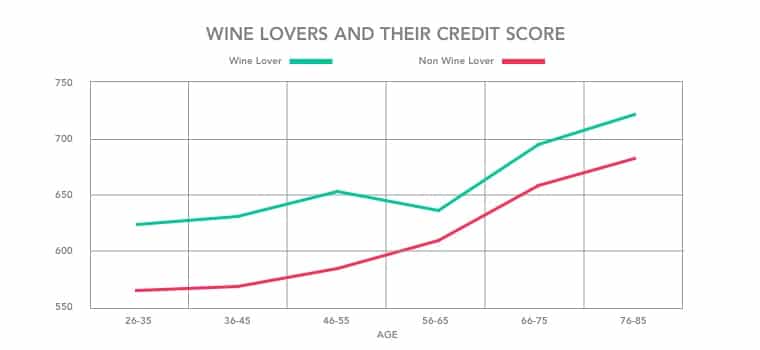Wine drinkers don’t need another reason to consume their favorite variety, but recent research may give them more bragging rights.
According to several studies, wine actually increases cognitive ability, in some cases even more than math or reading. If higher intelligence wasn’t enough, there’s also quantitative proof that loving wine can spill into the financial area of our lives. Recent research supports the theory that wine lovers tend to have good credit scores.
The connection between cocktails and credit isn’t as arbitrary as it may seem, and the direct line between the two has to do with logic. Here’s the reasoning behind why wine lovers may have better credit scores than non-wine lovers.
Raise a Glass
Americans drank 966 million gallons of wine in 2018 (latest figure available) with an average 2.95 gallons per person.
Because wine consumption fires the senses as well as the motor, emotion and pleasure systems, the brain is highly engaged during responsible consumption, according to neuroscience experts.
From seeing, smelling and tasting the drink, to interpreting what the flavors mean (too many tannins or just the right amount?), wine consumption is said to exercise both sides of the brain.
The left side controls logic and reasoning; the right side controls imagination and awareness. Using the whole brain promotes intelligence, leading scientists to conclude that because drinking wine engages the brain, drinking wine (responsibly) may promote intelligence.
Credit Score Analysis
ScoreSense wanted to take the logic one step further to see if loving wine also correlated to positive credit scores.

ScoreSense researchers analyzed data of 3,535 consumers between May 2019 and December 2019. The analysis revealed that those who love wine had credit scores of 650 to 675. Those who don’t love wine had credit scores of 600 to 625.
Brian Sullivan, vice president of marketing at ScoreSense, put it this way: “Smart people, many of whom are wine lovers, understand the importance of good credit, and how their credit scores impact short- and long-term finances. The numbers from our analysis corroborate our whimsical theory.”
Brain Power and Credit Scores
Because focusing on finances requires input from the whole brain — specifically logic, reasoning and awareness — that may explain why wine lovers take their credit seriously.
“The difference between a 675 credit score and a 600 credit score can be huge in terms of interest rates and the amount you’ll pay in interest over the course of a year or longer. Smart people understand they save money with good credit scores, so they focus on things like payment history and keeping debt in check,” Sullivan says.
Age Matters with Wine — and Credit
There’s also another connection between drinking wine and having good credit. Wine gets better with age, and so can your credit scores.
Credit age accounts for 10% of your overall number, so the longer you have established credit in good standing, the higher your scores could be.
Good credit is worth toasting. Keep up the progress — and take a moment to celebrate – and drink responsibly.





